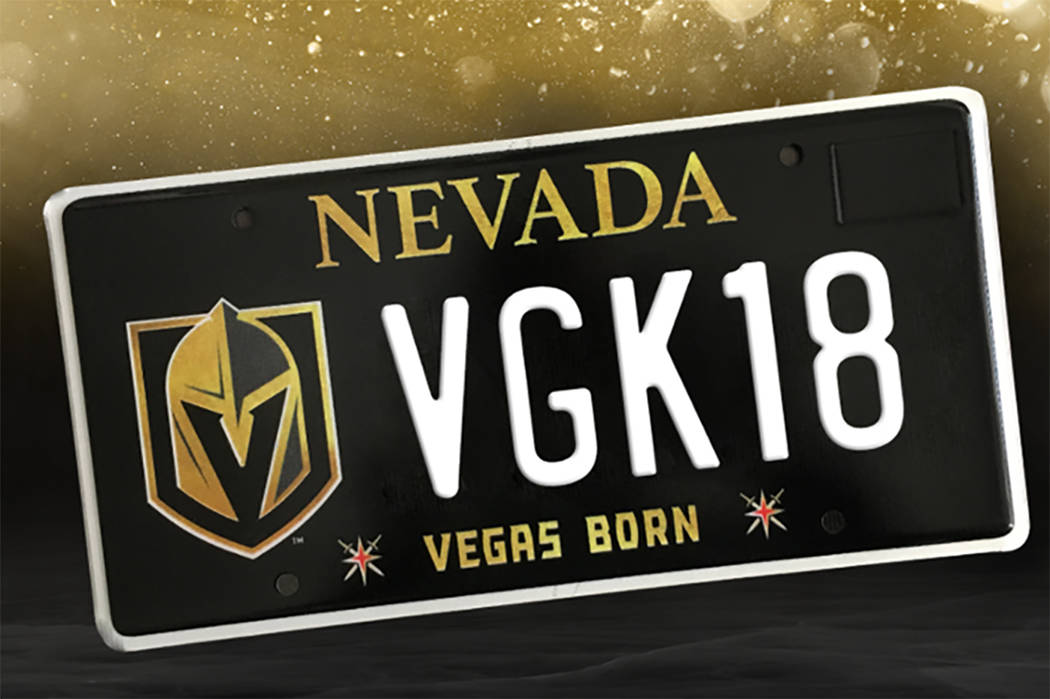Vegas Golden Knights hope to add charitable arm to license plate in 2019


As the Vegas Golden Knights specialty Nevada license plate quickly becomes one of the most popular in Nevada’s history, questions have arisen regarding where the funds from their sales go.
At this point, all the money goes directly to the state for road construction and plate production fees, though the team hopes to change that next year.
A standard “Vegas Born” plate costs $37, with a $10 per year registration renewal fee. Of that, $35 goes toward the state revolving account to offset costs of plate production. If the fund’s balance is over $50,000, money is transferred to the state highway fund at the end of each fiscal year, the Nevada Department of Motor Vehicles said.
Additionally, $1 goes to each of a technology fund for DMV computer system modernization and a prison industry fund aimed at promoting and developing vocational programs in state prisons.
All standard specialty plates with a charitable cause attached cost $62 — with the exception of the Children in Arts and Missing and Exploited Children plates, which run $52 — with annual renewal fees ranging from $15-$25. They have the same fee structure as the Golden Knights plate, with the additional registration fees going toward their cause at a rate varying between $15 and $30.
For reference, the Raiders specialty plate will contribute $30 from each plate sold toward the Raiders Foundation, the team’s charitable arm, when the plate is made available in January, the team announced last week.
Personalized specialty plates with a charitable cause attached run between $87-$97 for the original registration, with a yearly fee of between $40-$50. The amount that goes to the charity cause is the same as a standard plate.
The Golden Knights plate was approved during the 2017 legislature via Senate Bill 293, which allowed the plate to be excluded from the usual specialty plate fee guidelines. The team’s charity, Vegas Golden Knights Foundation, was excluded then because it wasn’t approved by the state as an official charity until August 2017, a few months after the plate’s approval.
In a statement, the Golden Knights said they recognize the unusual situation. “While there are limitations, the current measure provides anxious Golden Knights fans the opportunity to show their support for the team,” the statement said.
The usual process involves an established nonprofit organization that is already registered with the Nevada Secretary of State or governmental agency requesting the plate, with financial support tied to services to the community relating to public health, education, or general welfare, according to the DMV. All plates require approval by the Legislative Commission on Special License Plates.
Plates cannot promote, advertise or endorse any specific product, brand name or service or promote any specific religion, faith or anti-religious belief, according to the DMV.
The Golden Knights plan to address the lack of a charitable contribution with their plate with lawmakers next year, in hopes of attaching their VGK Foundation to the plates’ sales. The VGK Foundation focuses on various areas of need in the Las Vegas valley including children in sports, enhancing education for both students and teachers, military initiatives, homelessness and hunger issues.
“We are hopeful that the 2019 Legislature revisits this issue and sees the wisdom in adding a fee to each new plate and renewal with such funds going directly to the Foundation for charitable purposes,” the team said in a statement.
Contact Mick Akers at makers@reviewjournal.com or 702-387-2920. Follow @mickakers on Twitter.













